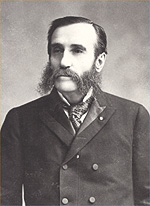Félix-Gabriel Marchand
Félix-Gabriel Marchand (born January 9, 1832 in Saint-Jean-sur-Richelieu , Québec , † September 25, 1900 in Québec ) was a Canadian politician , notary , author and journalist . From 1867 until his death he was a member of the National Assembly of Québec without interruption and from 1892 to 1900 he chaired the Parti libéral du Québec . From May 24, 1897 he ruled the province of Quebec as Prime Minister; he died in office.
biography
The father was a wealthy French Canadian timber merchant, the mother had Scottish ancestors. Marchand received his education in both English and French. He completed the seminar in Saint-Hyacinthe and trained as a notary . Marchand's political career began in 1868 when he was elected to the city council of Saint-Jean-sur-Richelieu. He was also the president of the local agricultural society and chairman of the school commission. Marchand founded the magazine Le Franco-Canadien in 1860 , which represented liberal ideas. In 1861 he made in response to the Trent affair an existing volunteer infantry - Militia and commanded them to 1880, wherein it to the rank of Lt. Col. climb.
In 1867 Marchand ran for the first elections to the National Assembly of Québec and won the constituency of Saint-Jean. He held that seat for 33 years and was re-elected eight times in a row. Most of the Liberals were in the opposition for the first three decades. Marchand's main concern was to strengthen federalism . In 1874, his proposal to ban double mandates at provincial and federal level was accepted in the seventh attempt. This was intended to reduce the influence of the federal government on provincial legislation. Another important concern was the intensification of inland colonization (combined with infrastructure construction) in order to curb the emigration of French Canadians to the USA .
From March 1878 to October 1879, the Liberals under Henri-Gustave Joly de Lotbinière temporarily put the government. During this time Marchand belonged to the cabinet as government secretary and commissioner for the crown lands . Back in opposition, he turned increasingly to writing. He specialized in comedies, fables and poetry. From January 1887 to April 1892, during the reign of Honoré Mercier , Marchand was Speaker of the National Assembly. After Mercier was deposed because of the Chaleur Bay scandal and the Liberals had clearly lost the elections of 1892, he took over the party leadership.
Marchand's aim as opposition leader was to improve the battered reputation of the Liberals and cast doubt on that of the Conservatives. He repeatedly attacked the self-interest and the opportunism of the government, which he consistently referred to as the "tax collector" because of the controversial tax policy. The Parti libéral du Québec achieved a clear election victory after five years and Marchand was sworn in as the new Prime Minister on May 24, 1897. Shortly before, he had been elected President of the Royal Society of Canada ; the following year he gave up this office.
As prime minister, Marchand had three goals: a balanced budget, increased use of natural resources and the creation of a ministry of education. At that time, the educational system of the province was entirely in the hands of the clergy of the Roman Catholic Church . The National Assembly passed a corresponding law, but the Legislative Council , which continued to be dominated by Conservatives, rejected it. The secularization of the education system would not succeed until 1964. Marchand suffered from arteriosclerosis and had to delegate his official duties more and more to his cabinet. He finally died on September 25, 1900 at the age of 68.
Works
- Fatenville (1869)
- Erreur n'est pas compte ou les inconvenients d'une ressemblance (1872)
- Un bonheur en attire un autre (1883)
- Les travers du siècle (1884)
- Le lauréat (1885)
- Les faux brillants (1885)
- L'aigle et la marmotte (1885)
- Nos gros chagrins et nos petites misères (1889)
Web links
- Félix-Gabriel Marchand . In: Dictionary of Canadian Biography . 24 volumes, 1966–2018. University of Toronto Press, Toronto ( English , French ).
- Biography on the Québec National Assembly website (French)
| personal data | |
|---|---|
| SURNAME | Marchand, Felix-Gabriel |
| BRIEF DESCRIPTION | Canadian politician, notary public, author and journalist |
| DATE OF BIRTH | January 9, 1832 |
| PLACE OF BIRTH | Saint-Jean-sur-Richelieu |
| DATE OF DEATH | September 25, 1900 |
| Place of death | Quebec City |

